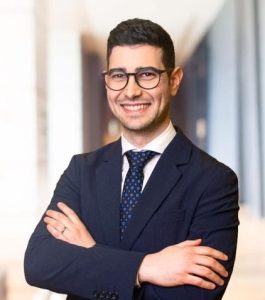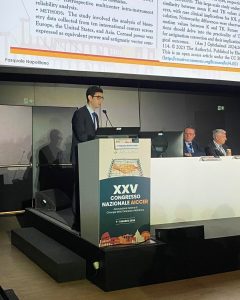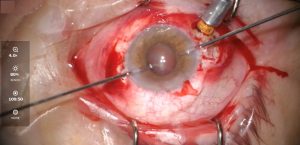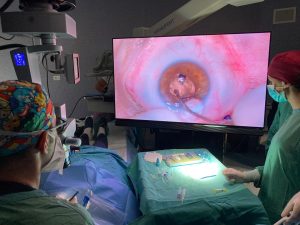"Watching the same surgery thousands of times, performed by different surgeons, is not wasted time, but an opportunity to learn everything from everyone".
Broadening one's views and then study, dedication and passion as 'ingredients' that must accompany the training and professional growth of the young surgeon. This emerges from the account of Dr Pasquale Napolitano, who also presents us with two interesting cases, one very complex and the other... rather unusual.
How did you choose your training in Ophthalmology and what is your current professional profile?

I am 34 years old and a young surgeon working at the Clinica Mediterranea in Naples. I am currently involved in refractive surgery, cataract surgery, and vitreo-retinal surgery.
I was fortunate enough to enrich my educational curriculum with a PhD in Translational and Clinical Medicine at the University of Molise, where I was interested in the intestinal microbiota and how it influences the course of ocular pathologies. I currently collaborate with the University of Naples Federico II, where I devote myself exclusively to research and in collaboration with the Prof Costagliola, first reported and studied the effectiveness of adjuvant treatment with probiotics for particularly complex eye diseases, such as uveitis.
 Every day I enjoy being a surgeon and have the pleasure of working in one of the most popular private clinics in the Campania region. Thanks to the help of Prof Orpheus and all the staff in the ophthalmology department, I was able to hone my surgical skills to the point of obtaining my own role in the operating theatre. I consider myself very lucky, because at my young age I can be proud to have obtained my own space, to have trained myself and to work not only in Italy, but in the region where I grew up, without having to spend long periods outside to look for space elsewhere.
Every day I enjoy being a surgeon and have the pleasure of working in one of the most popular private clinics in the Campania region. Thanks to the help of Prof Orpheus and all the staff in the ophthalmology department, I was able to hone my surgical skills to the point of obtaining my own role in the operating theatre. I consider myself very lucky, because at my young age I can be proud to have obtained my own space, to have trained myself and to work not only in Italy, but in the region where I grew up, without having to spend long periods outside to look for space elsewhere.
Moreover, I am particularly proud of my small town of origin, Brusciano in the province of Naples, where, alongside my father, the true promoter of my passion for this subject, we take care of less fortunate people who have more difficulty accessing eye surgery, which has now become routine in the city.
I had been attending our village clinic since I was a child, when I would go to the studio with Dad and ask him to explain to me how the eye worked and what those strange black and white photos were that he meticulously developed and pasted together.
I am and always will be very proud of my origins and I make no secret of the fact that, as always, helping the simplest people is what gives a young person like me the most satisfaction and stimulation.
Can you tell us about an unusual or particularly complex clinical case that you managed to handle and solve?

One of the most complex clinical cases I had to deal with was that of an elderly patient who had suffered a dislocation of the IOL in the vitreous chamber as a result of trauma. With the help of my instructor, the Prof Federico ToniI was able to perform a successful vitrectomy and removal of the dislocated lens with secondary scleral fixation IOL implantation. When we operate on eyes that have suffered trauma, the ocular dynamics are completely different and altered and everything can degenerate at any moment. In addition, secondary implantation requires a great knowledge of ocular anatomy as well as great manual dexterity in the management of the operation and of any complications that may be triggered by gestures that are perhaps too hasty or rash.
Among the strangest cases I had to deal with, I cannot fail to mention the cataract patients operated on during the humanitarian mission in Burkina Faso, in which I participated. In addition to all the difficulties one can imagine in having to operate on desperate cases like those in Africa with few means, there was the fact that in the absence of a medical reference on the ground, patients went to witch doctors, who advised them to look into the fire in order to dissolve the opacity of the crystalline lens that clouded their vision and caused cataracts. Obviously, not only did this have none of the desired effects, but it burnt the cornea of the poor unfortunate patients, making our work even more complicated.
A few tips for young colleagues starting out in Ophthalmology.

My suggestion to my younger colleagues is to not despair and to persevere.
It is not always necessary to leave home and family to try to learn what we really want to do in life.
Study, dedication and passion are the real key and perseverance will eventually pay off. Very often we are attracted by easy money or the simple life, actually making some sacrifices and spending time investing in yourself is the best thing you can do.
Time spent in the various operating theatres watching the same operation performed thousands of times by different surgeons is not time wasted, but an opportunity to learn everything from everyone, because I believe that even when we think we know everything about a certain subject or a certain technique, we will always see someone who succeeds better by doing it differently. This should be the stimulus to try our hand at something we are not good at, to leave our safe harbour to broaden our views.
On the subject of vitreo-retinal surgery see:
Treatment of ocular inflammation after vitreoretinal surgery (oculistaitaliano.it)
Under the heading "I tell you a story..."
- "The more I like doing something..." - Italian ophthalmologist
Interview with Dr Silvio Zagari - 'Give a woman the appropriate opportunities and...' - Italian Ophthalmologist
Interview with Dr Manuela D'Aquino - Open up to the world!!! - Italian Ophthalmologist
Interview with Dr Miguel Rechichi - The 'allologist' is a thing of the past - Oculista Italiano
Interview with Dr Francesco Cerbella - Every clinical case: an opportunity for growth - Oculista Italiano
Interview with Dr Marco Zagari - Basic skills in each subspeciality - Oculista Italiano
Interview with Dr Beatrice Tombolini - Let your heart lead you too - Oculista Italiano
Interview with Dr Danilo Mazzacane - The privilege of caring for people - Oculista Italiano
Interview with Dr Giovanni Scandura - "Travelling a lot to learn... - Oculista Italiano
Interview with Dr Federica Fossataro - The best refractive solution for each individual patient - Oculista Italiano
Interview Dr. Antonio Randazzo
Editorial info
Our column is open to all ophthalmologists who are interested in telling their colleagues and our web audience about a clinical case.
We invite anyone wishing to participate in our publishing project to contact
Editorial Board 'l'Oculista italiano' - Ada Puglisi
Tel. +39 095 79.22.145
E-mail: info@oculistaitaliano.it
Or write to us using one of our contact forms
